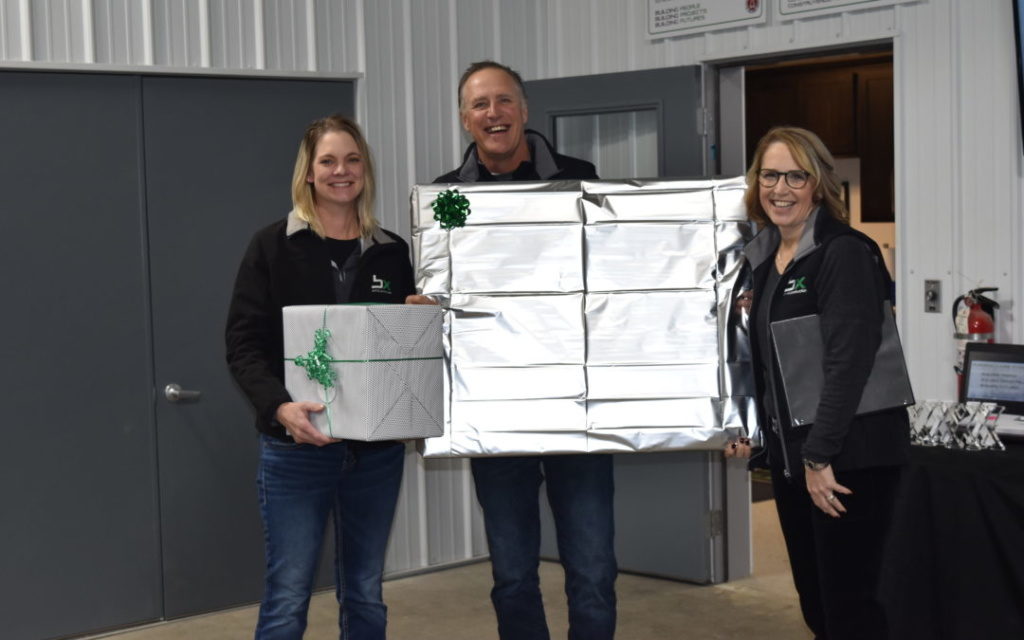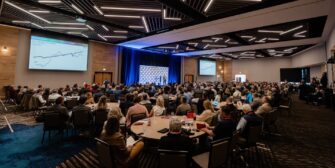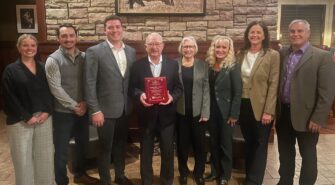Preview a ‘taste’ of family business at one-of-a-kind dinner
Recent News
Contractor that strives to ‘be excellent’ builds for the future
Posted in Member News | October 23, 2019
It has taken Kari Karst awhile to think of her business as a family business.
But over its 57-year history, BX Civil & Construction Inc. actually has had ties to three family business.
Under Karst’s leadership, the Dell Rapids-based company founded in 1962 as Buskerud Construction is now in a period of unprecedented growth and looking toward its next generation.
“We just really believe in what we set up as a company,” she said. “I’m very, very passionate about the industry, probably a lot because of my dad.”
Karst grew up in the construction industry. Her father, Merle Davis, worked for Buskerud in the 1960s before joining another family business, Sweetman Construction, where he was the company’s president.

Sweetman bought Buskerud in 1982, and 10 years later the chance came for Karst to enter it.
At the time, she and her husband, Rob, were living in California. Both are native South Dakotans who met out west. She was putting her degree in civil engineering from the South Dakota School of Mines & Technology to work, and he was working as a power lineman for Southern California Edison.
“So we were both pretty established in our careers, and never in a million years did I think I would move back to South Dakota,” she said. “It’s not because I hated South Dakota, but I didn’t think there were opportunities. Everybody I knew in the 1980s left because there wasn’t a pull to stay here.”
But the opportunity came for the Karsts.
The state of South Dakota was looking for women-owned businesses to work on construction projects as a subcontractor, allowing the state to be credited for working with diverse businesses.
That meant Karst, with her background as a civil engineer, could buy the controlling interest in Buskerud and capitalize on a market opportunity.
“We were in our late 20s and decided if we’re going to try something like this, this was the time to try it. We didn’t have any kids yet. We didn’t have anything to really lose. So we moved back in 1992 and honestly haven’t looked back.”
Building on Buskerud
In 1992, a female CEO of a South Dakota construction company was enough to rouse some skeptics. But Karst proved herself.

“It took about a year for me to get certified so we could bid on projects as a woman-owned company,” she said. “The first assumption was that I wasn’t real, I was just a figurehead. But we got through those hoops and began growing the business.”
Later that decade, they bought Dells Materials Co., a ready-mix plant that shares some services with BX but is a separate company.
In 2009, they added Terin Corp., a paving contractor.

“And that spurred another level of growth,” Karst said. “It was a really good fit.”
After making it through the recession, Karst said by 2012 it was time again to focus on the company’s future.
“We really needed to rebrand,” she said. “I never wanted it to be Kari Karst Construction because that’s not who I was or wanted to be, but we needed to put it out there that we have the same values we have when we were founded and make sure people understand that.”
They settled on “BX” for a couple of reasons. The “B” is a nod to its history as Buskerud. The “BX” together evokes “be excellent,” which is the company’s strongest core value.

“That wraps up all the other values we have,” Karst said. “We believe in striving to be excellent, and that’s especially true when it comes to our focus on our employees. We work really hard to make sure we offer great benefits and to make sure we treat our employees really well.”
There are considerably more employees to support than when they took over in 1992. As revenue has grown twentyfold, the team has increased from between 15 and 20 employees when the Karsts took over to 130 at the height of construction season.

Karst said she’s proud that satisfied employees have referred the company to others.
“Of course, we offer health care and wellness and retirement plans and discounts and paid time off, but we also spend a lot of time training people all year,” she said.

“We do employee appreciation. We recognize birthdays. We call them out on social media. We’re involved in many different associations and really putting our money where our mouth is when it comes to engaging our workforce.”

The company appears to be thriving with that approach.
A major symbol of how much BX has grown: It served as general contractor for the $17 million Interstate 29 interchange project in Brookings.

The company works on projects statewide as well as in Iowa, Minnesota, Nebraska and North Dakota.
“We’re now focused on fewer and larger projects,” Karst said.

“We used to do 50 to 60 smaller projects as a subcontractor, and we’re now doing 40 much larger projects, half as general contractor and half as a subcontractor. We have engineers and construction managers who can manage larger projects and really do it well. I’m really proud of our people and what we do.”
Planning for the future
While Karst is a well-known face in organizations dedicated to supporting the construction industry and its workforce needs — even recently being appointed to the national board of the Associated General Contractors — she’s a newer member of the Prairie Family Business Association.

She joined earlier this year as she began thinking harder about the future of her family business.
“I’ve always known about Prairie Family Business, but I’m so involved in other industry areas that I just didn’t feel I had the energy to give to it,” she said.
“But I’m now at the point where we really need to take advantage of the resources they have and get serious. Something could happen to me tomorrow, and I need to be prepared.”
The Karsts have two sons: Colin, a project manager at Gage Brothers Concrete Products, and Adam, who recently joined BX as a project supervisor.

“Colin loves his job at Gage and has learned a lot, so I feel like his career path is there, and Adam is out running jobs right now, so we’re trying to see if what we will do is transition it to family in the years ahead.”
Initial discussions with Prairie Family Business helped Karst have conversations about bringing Adam into the business.
“We thought he should probably go work elsewhere first, but we had holes to fill, and it seemed like opportunities for him would be greater here. And he wouldn’t be working directly for me,” she said.
“My operations manager actually convinced me it was the right move, and he would take it on a sponsor. I want him to learn the business from the ground up, but he’s also in a completely different position from someone not in a position to potentially inherit the company.”
She and her husband also have navigated their roles within their businesses and take advantage of each other’s skills, she added.
“I sometimes feel like I get the limelight speaking for the company, but he’s the boots on the ground behind the scenes who can motivate people,” she said. “Everybody likes Rob, but he’s also very much a driver who wants to make sure we get done.”
At 56, she’s not ready to retire. But she is ready to start talking about the future – and that has been an evolution for the two of them, she said.
“I always wanted to be able to transition to family if that was the right thing for our family, and he was always more open to other types of transitions,” she said. “I’m excited for Prairie Family Business to literally help us put those issues out on paper, and I know they will help us work through those.”
She’s also excited for Adam to join a peer group with others from his generation who are in family businesses.
“I’m part of a peer group in my industry, and I think there will be huge value for him,” Karst said.
Stephanie Larscheid, executive director of the Prairie Family Business Association, agreed.
“The Karst family is coming to us at such an opportune time in their family business journey,” she said. “We can’t wait to connect them with exactly the resources they need, and we know they in turn are going to be an outstanding resource for their fellow association members.”
For Karst, legacy is important. It’s what drew her to her industry years ago, watching her father build things that would endure for decades.
“That’s the wonderful opportunity of this industry. You talk to those in construction, and they will tell you they love seeing the fruits of their labor every day. There aren’t many other places you can work like that,” she said.
“I want that legacy to go on for my family. I want the pride of doing something and driving around and looking at your projects. And it will be done different 20 years from now, but I want to be part of that too. I want to do things better than we did 20 years ago, and I want to do things better 20 years from now.”



